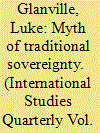| Srl | Item |
| 1 |
ID:
146180


|
|
|
|
|
| Summary/Abstract |
Why do internal wars start anew after they apparently end? I argue that rebel arrangements made for strategic reasons during wars sometimes create provocative effects even after conflicts end; coalitions formed between opposing groups during conflicts often precipitate disruptive commitment problems at the end of wars. This competition can abet the conflict renewal process, especially after wars terminating in military outcomes. Using new data on competitive militant alliances in civil wars, this study probes how rebel rivalries impact peace duration after wars. The evidence indicates that rivalry within coalitions shortens the period of postconflict peace. Wars ending in military victories give way, as many scholars argue, to lengthier periods of peace. But this effect reverses in the context of conflicts characterized by competitive alliances. Indeed, the combination of competitive alliances and a military victory strongly precipitates a resumption of hostilities. This perpetuation of the “conflict trap” proves especially pronounced when rebels win wars. My study implies that peacekeeping or third party forces may find the least local consent for their presence precisely where they matter most in post-conflict environments. As former work has shown, victorious rebels, having wrested power by force from vanquished governments, have relatively little desire for outside interference.
|
|
|
|
|
|
|
|
|
|
|
|
|
|
|
|
| 2 |
ID:
119642


|
|
|
|
|
| Publication |
2013.
|
| Summary/Abstract |
The conventional story of sovereignty told in the discipline of International Relations (IR) tells us that there is a "traditional" or "Westphalian" meaning of sovereignty that has prevailed since the seventeenth century and that accords states the right to govern themselves free from outside interference. In recent years, the tale goes, this meaning has been challenged for the first time by notions of conditional and responsible sovereignty. This article argues that the supposed "traditional" meaning of sovereignty is not as foundational and timeless as is often assumed. Rather than a right of non-intervention, it was the right to wage (just) war that was first conceived by political theorists to be the external corollary of the internal supremacy of the sovereign. This included the right of war to punish tyranny and rescue the oppressed. This article examines the initial absence and then the gradual emergence of the "traditional" meaning of sovereignty, arguing that it was only firmly established by international society for the first time in the twentieth century. It concludes by considering some of the implications of this revised story of sovereignty for the study of IR.
|
|
|
|
|
|
|
|
|
|
|
|
|
|
|
|